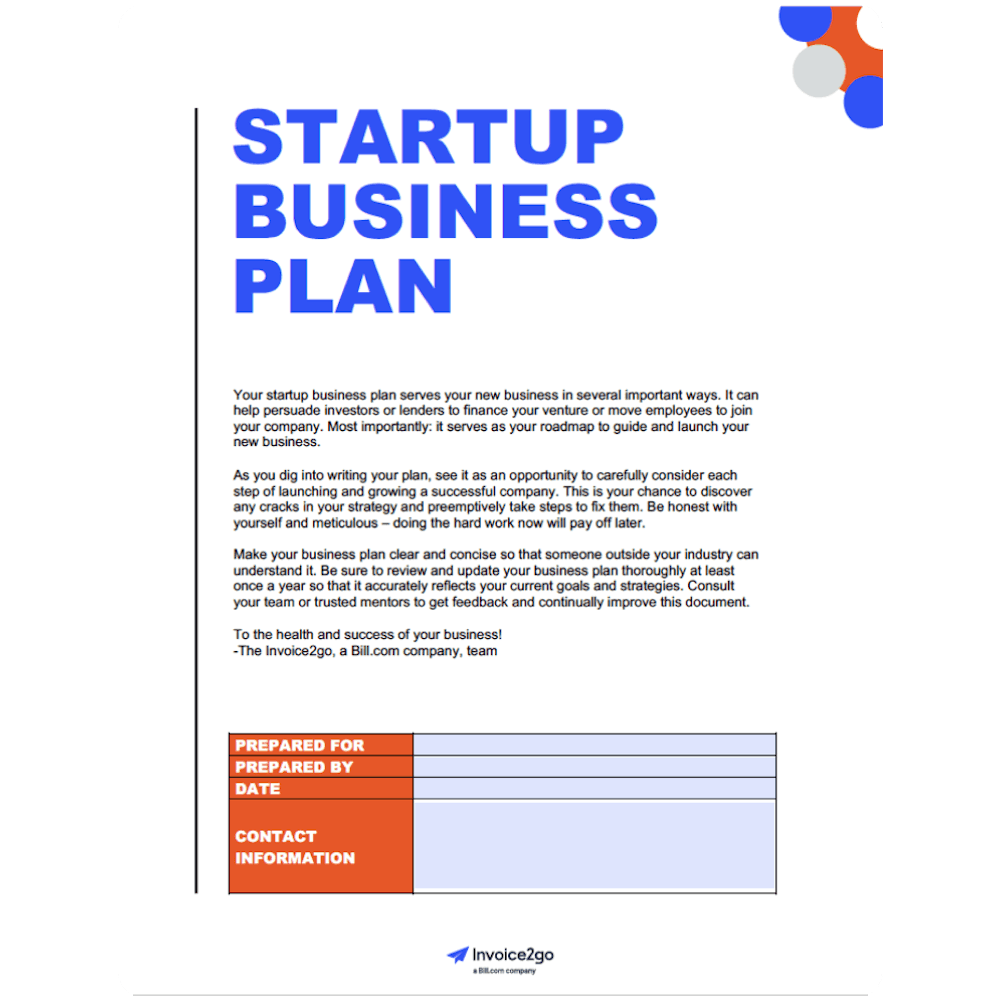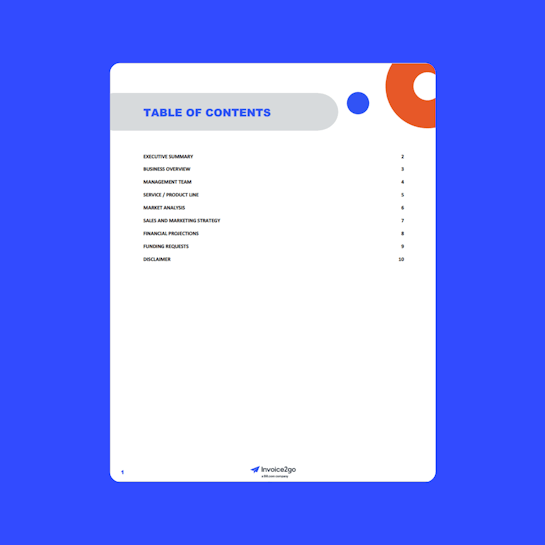Free Startup Business Plan Template
Do you want to start a business? A startup business plan will guide you through various stages of launching and managing a business.

Download our startup business plan template
We offer free business plan templates that help entrepreneurs plan their businesses. Use our business template as a guide to putting together your startup business plan, but feel free to customize it and make it your own.
What is a startup business plan
A startup business plan is a document outlining strategies and ideas for launching and running your new business. It’s crucial to understand your target customers, the goods or services clients need, and your company’s long-term goals before writing a business plan.

Benefits of using a startup business plan template?
Startup business plan templates aid entrepreneurs in creating successful business plans because they are:
- Easy to use.
- Help entrepreneurs select plans matching their ideas.
- Enable first-time business owners to create effective business plans using a step-by-step guide.
- Help entrepreneurs write business plans within a short time.

How to edit a startup business plan?
A business plan should be concise, clear, and easy to follow. If you’re using the plan to get funding, it should convince lenders that your idea is viable. Editing a startup business plan includes:
- Checking for grammar, punctuation, and spelling errors
- Making sure the critical aspects of the plan are clear
- Suggesting potential structural and flow improvements
- Offering feedback on vocabulary and writing style
- Maintaining a professional, formal tone throughout the text
How to create a startup business plan?
You can create a business plan with or without a business plan template. An outline makes writing a business plan very easy for first-time entrepreneurs as it highlights all the components to include in their business plan. Traditional business plans can be as long as 30-50 pages; however, a one-page business plan can get you started with essential information.
The process of writing a business plan involves:
- Coming up with a vision, mission, and values for your startup. When writing a business plan, it’s vital to understand your business, what it does, its mission, and its customers. The mission defines the company’s reason for existing.
- Outlining executive summary. Highlight what your business offers and its chances of success. You can include basic details about the company’s leadership, location, employees, and financial information.
- Developing your startup goals. Write down the goals and milestones for your business. Create short-term and long-term goals to measure your success.
- Writing a company description. The company description provides detailed information about your startup and business idea. Provide specific details of how your business solves problems and lists consumers. Also, explain your startup’s competitive advantages, such as expertise and business location.
- Analyzing your target market. Market analysis provides an understanding of industry outlook and target customers. The research helps entrepreneurs understand competitors’ products and strengths.
- Indicating products or services your startup will offer. Please describe which products or services your company will provide. You can include the products’ benefit customers and their life cycle. Also, state how and where customers can purchase your goods or services.
- Coming up with revenue streams. Describe how your business will make money, for example, direct sales, selling advertising space, and membership fees. If your venture relies on multiple revenue streams, state them all.
There’s no perfect way of writing a business plan. You can choose between a traditional or lean business plan format. A traditional business plan is detail-oriented and takes more time to create – investors and lenders may request this plan. On the other hand, a lean business plan is fast to write and entails key components only. This plan is best used for internal stakeholders.
FAQ: Everything about startup business plans
What to include in a startup business plan?
What to include in a startup business plan?
A startup business plan includes:
- Key partners and businesses you’ll work with to manage your business, including manufacturers, suppliers, and subcontractors.
- Sales and marketing strategy that will give your company a competitive advantage over competitors.
- All resources your company will leverage to create value for customers.
- The unique value proposition that your business idea brings to the market.
- A concise cost structure and financial projections.
What is the purpose of a startup business plan?
What is the purpose of a startup business plan?
The primary objective of a startup business plan is to help manage a company by identifying the firm’s goals and ways of achieving them. The plan summarizes why a business exists, what it’s about, and where it intends to go. Moreover, a startup business plan is created to conduct a financial projection to show the business’s financial situation. It examines if there is a need to look for external funding.
Do startups need a business plan?
Do startups need a business plan?
Writing a business plan is essential for a startup to succeed. Here are reasons why a business plan is necessary:
- Obtain external funding. Lending institutions require entrepreneurs to develop a clear business plan before approving loans. Startups need business plans to obtain loan approvals and other forms of financing.
- Write your startup budget. A business plan includes a budget, thus limiting cases of purchasing unwanted products. Financiers will use your estimates to establish how you’ll utilize cash.
- Convince partners to join your business. Investors and employees can use the plan to weigh their options of joining your team. Partners will bring expertise and experience to your business.
- Set milestones to measure success. A good startup business plan involves timelines for achieving short-term goals. Long-term plans are feasible if your business attains the objectives in the timeframe.
- Estimate cash flows for your business. Business plans provide cash flow projections that enable entrepreneurs to know if their goals are achievable. Entrepreneurs can notice any cash flow shortages on time.

